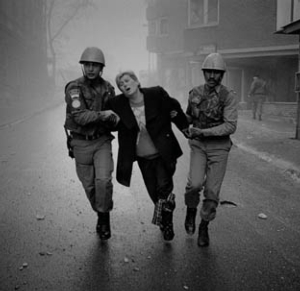There's a point early on in Paul Auster's new novel in which he recounts an incident concerning the protagonist's daughter, a battery operated razor and a toilet bowl.
Rachel Glass is shaving her legs, one foot up on the toilet bowl for support. The razor slips from her grasp, falls into the toilet and becomes stuck in the flush-hole. Nathan, her father, is summoned but the razor is wedged tight. Refusing to be defeated, and rather than calling out a plumber, he chooses to disconnect the toilet. Having done so, he takes it outside, smashes it to pieces with a sledgehammer and retrieves the razor, which still works.
The incident, delivered in Auster's characteristically chatty tone, is one of many destined for Nathan Glass's magnum opus – The Book of Human Folly – "an account of every blunder, every pratfall, every embarrassment, every idiocy, every foible, and every inane act I had committed during my long and checkered (sic) career as a man."
If you find the toilet bowl story illuminating and/or amusing, the chances are that you'll enjoy the catalogue of other such events which comprise the novel.
Sixtysomething Nathan Glass has embarked on this writing project on the advice of his daughter, Rachel. She has recognised that since he retired his life needs a new focus. Nathan has lung cancer but it's in remission.
Formerly a life insurance salesman, he's recently divorced and intends to live out the remains of his life on his share of the proceeds from the family home. Brooklyn suits him. "I've already grown attached to my neighbourhood, with its shifting jumble of white and brown and black, its multilayered chorus of foreign accents, its children and its trees, its striving middle-class families, its lesbian couples, its Korean grocery stores, its bearded Indian holy man in his white robes "
When he's not writing Nat spends his days wandering his beloved neighbourhood, chatting to the locals, always eating lunch in the same diner, lusting after the same waitress (a folly which eventually earns him a warning visit from her thuggish husband).
You can imagine Paul Auster doing the same; in many respects Brooklyn Follies is a love letter both to the city and a writer's way of life. Indeed the writing shifts up a gear when he describes, "gliding through Times Square at three-thirty in the morning, and all the traffic is gone, and suddenly you're alone in the center of the world, with neon raining down on you from every corner of the sky. Or pushing the speedometer up past seventy on the Belt parkway just before dawn and smelling the ocean as it pours in on you through the open window."
The involving drama that plays out against this neon-lit backdrop begins when Nathan runs into his nephew, Tom, in a local bookstore. He hasn't seen Tom for seven years. The last he knew was that he was on his way to the University of Michigan to study American Literature. Tom was always a favourite. Nathan envied him his likely future in academia but they lost touch following the death of Nathan's sister.
It's soon evident that the glittering university career mapped out for his nephew hasn't quite worked out, and he now earns his living in the bookstore. The relationship is immediately rekindled. "No matter that I was twice his age and had once been known as Uncle Nat. As Oscar Wilde once put it, after 25 everyone is the same age. And the truth was that our circumstances were almost identical."
Tom introduces Nat to his employer, an old rogue called Harry Brightman who has served time for selling forged paintings. Harry's bookselling business is legitimate but he's bored and he hankers for the excitement he felt when he was operating on the wrong side of the law.
With a timid knock on the door, Auster then brings on a waif, Lucy, Tom's nine year-old niece. She appears one morning intent on moving in with him.
Just why this shy, silent child has been sent away from her former porn-star mother, and ex-junkie, now fundamentalist Christian stepfather, is eventually revealed.Auster recounts it as you imagine he would to his favourite waitress in his favourite diner over the course of several lunchtimes.
The author is an engaging companion who, like Truman Capote before him, has the ability to make something magical of the city and the experiences of the people who live in it. At one point Harry Brightman confesses to Nathan that, as a child, one of his dreams "was to publish an encyclopaedia in which all the information was false. Wrong dates for every historical event. Wrong locations for every river, biographies of people who never existed. What kind of person imagines doing a thing like that?"
A novelist, I suppose. What else do they spend their days doing but writing encyclopaedias of lies? A writer like Paul Auster knows how to make lies believable. It is this skill that makes Brooklyn Follies such an entertaining read.

